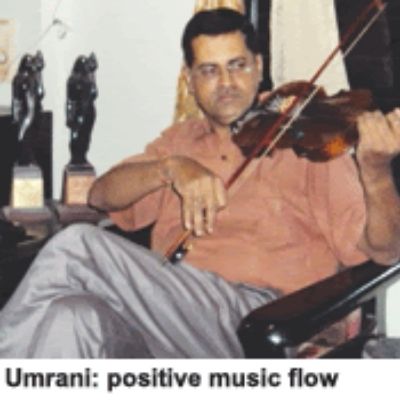Music therapist: Shrirang Umrani
 Pune-based musician Shrirang Umrani, winner of a Maharashtra state award for the background track of the Sunil Sukhtankar and Sumitra Bhave-directed Marathi film Dahavi F (2002), lets his musical talent flow outwards to positively impact other people’s lives. It’s an experiment that has paid him rich dividends because for the past 24 years that Umrani has used music as therapy, he has shared the elation and serenity of reformed drug and alcohol addicts.
Pune-based musician Shrirang Umrani, winner of a Maharashtra state award for the background track of the Sunil Sukhtankar and Sumitra Bhave-directed Marathi film Dahavi F (2002), lets his musical talent flow outwards to positively impact other people’s lives. It’s an experiment that has paid him rich dividends because for the past 24 years that Umrani has used music as therapy, he has shared the elation and serenity of reformed drug and alcohol addicts.
Encouraged to learn and practice music early in life by his musician mother Kamala, and father Keshav, a theatre buff, Umrani initially learnt to play the guitar and enrolled as a student of the Godse Violin Vidyalaya as late as 1990. “I also play the harmonium,” says Umrani, a commerce graduate of Pune’s Fergusson College with a postgrad degree in social welfare from the city’s Wadia College.
Although in a parallel career Umrani has composed the musical scores of over 20 Marathi feature films, since 1986 he has been practising as a music therapist in drug, alcohol and substance de-addiction centres including Muktangan, Krupa Foundation, Nityanand, Manasvardhan, and the Satara-based Parivartan. Over the past quarter-century, since he teamed up with medical practitioners Anita and Anil Avachat, who established the city’s Muktangan de-addiction centre, Umrani has developed music therapies blending strains of Indian classical and raga-associated popular music to help addicts attain inner peace and calm.
“Initially I wanted to be a counsellor to help people overcome negativity and focus upon positive aspects of life. But later I began to use empathetic music, especially soothing ragas to support yoga and meditation, and infused interactive music into group therapy sessions to help the disturbed and highly strung develop sobriety and self-confidence,” says Umrani.
With each counselling session lasting up to an hour, Umrani usually ministers to 25-30 patients in a group. “I don’t prescribe the usual healing treatment where a patient has to listen to music played by the healer. In group therapy sessions, everyone connects with the music as participants,” he explains. “Music therapy plays an important role in sustaining rehabilitation, ensuring that addicts don’t lapse into their earlier lifestyle,” he adds.
With urbanised Indians experiencing high levels of daily stress in the country’s poorly planned and infrastructure deficit cities, music therapy could well prove to be yet another — in addition to yoga and meditation — Indian panacea for the rising incidence of stress-related maladies worldwide.
Huned Contractor (Pune)














Add comment